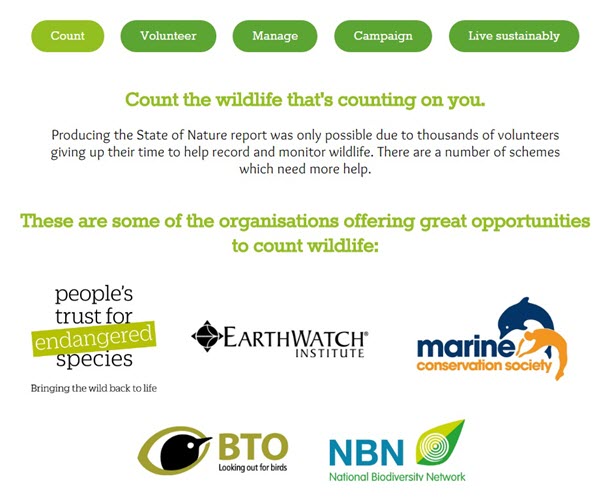It’s not too late to save UK nature but we must act now – that is the conclusion from a coalition of more than 50 leading wildlife and research organisations behind the State of Nature 2016 report. The National Biodiversity Network is one of those organisations.
Following on from the groundbreaking State of Nature report in 2013, leading professionals from 53 wildlife organisations have pooled expertise and knowledge to present the clearest picture to date of the status of our native species across land and sea. The report reveals that over half (56%) of UK species studied have declined since 1970, while more than one in ten (1,199 species) of the nearly 8000 species assessed in the UK are under threat of disappearing from our shores altogether.
There are many inspiring examples of conservation action that is helping to turn the tide. From pioneering science that has revealed for the first time the reasons why nature is changing in the UK, to conservation work – such as the re-introductions of the pine marten and large blue butterfly and the restoration of areas of our uplands, meadows and coastal habitats. But more is needed to put nature back where it belongs.
As the UK Government and devolved administrations move forward in the light of the EU Referendum result, there is an opportunity to secure world leading protection for our species and restoration of our nature. Now is the time to make ambitious decisions and significant investment in nature to ensure year-on-year improvement to the health and protection of the UK’s nature and environment for future generations.
The State of Nature 2016 UK report is launched by Sir David Attenborough and UK conservation and research organisations at the Royal Society in London on Wednesday, September 14, while separate events will be held in Edinburgh, Cardiff and Belfast over the next week.
Sir David Attenborough said: “The natural world is in serious trouble and it needs our help as never before. “The rallying call issued after the State of Nature report in 2013 has promoted exciting and innovative conservation projects. Landscapes are being restored, special places defended, struggling species being saved and brought back. But we need to build significantly on this progress if we are to provide a bright future for nature and for people.
“The future of nature is under threat and we must work together; Governments, conservationists, businesses and individuals, to help it. Millions of people in the UK care very passionately about nature and the environment and I believe that we can work together to turn around the fortunes of wildlife.”
In order to reduce the impact we are having on our wildlife, and to help struggling species, we needed to understand what’s causing these declines. Using evidence from the last 50 years, experts have identified that significant and ongoing changes in agricultural practices are having the single biggest impact on nature.
The widespread decline of nature in the UK remains a serious problem to this day. For the first time scientists have uncovered how wildlife has fared in recent years. The report reveals that since 2002 more than half (53%) of UK species studied have declined and there is little evidence to suggest that the rate of loss is slowing down.
Mark Eaton, lead author on the report, said: “Never before have we known this much about the state of UK nature and the threats it is facing. Since 2013, the partnership and many landowners have used this knowledge to underpin some amazing scientific and conservation work. But more is needed to put nature back where it belongs – we must continue to work to help restore our land and sea for wildlife.
“There is a real opportunity for the UK Government and devolved administrations to build on these efforts and deliver the significant investment and ambitious action needed to bring nature back from the brink.
“Of course, this report wouldn’t have been possible without the army of dedicated volunteers who brave all conditions to survey the UK’s wildlife. Knowledge is the most essential tool that a conservationist can have, and without their efforts, our knowledge would be significantly poorer.”
You can download a full copy of the State of Nature 2016 report
View the interactive State of Nature report infographic
You can also read Martin Harper’s blog
The State of Nature 2016 UK partnership includes:
A Focus on Nature, A Rocha UK, Association of Local Environmental Records Centres, Amphibian & Reptile Conservation, Bat Conservation Trust, Biological Records Centre, Botanical Society of Britain & Ireland, British Bryological Society, British Dragonfly Society, British Lichen Society, British Pteridological Society, British Trust for Ornithology, Buglife, Bumblebee Conservation Trust, Butterfly Conservation, Centre for Ecology & Hydrology, Chartered Institute for Ecology and Environmental Management, Conchological Society of Great Britain and Ireland, Durrell Wildlife Conservation Trust, Earthwatch Europe, Freshwater Habitats Trusts, Friends of the Earth, Froglife, Fungus Conservation Trust, Guernsey Government, iSpotnature (The Open University), States of Jersey Department of the Environment, Mammal Society, Manx Birdlife, Marine Biological Association, Marine Conservation Society, MARINElife, Marine Ecosystem Research Programme, National Forum for Biological Recording, National Trust, National Biodiversity Network, Natural History Museum, Orca, People’s Trust for Endangered Species, Plantlife, PREDICTS, Rothamsted Research, RSPB, Sir Alister Hardy Foundation for Ocean Science, Shark Trust, Sheffield University, Vincent Wildlife Trust, Whale and Dolphin Conservation, The Wildlife Trusts, Woodland Trust, World Wildlife Fund, Wildfowl & Wetlands Trust, Zoological Society of London.


